-
President 2012: Bernie Marcus Home Depot Co-Founder Says Obama is Choking Economic Recovery

According to this interview in Investor’s Business Daily.Bernie Marcus co-founded Home Depot (HD) in 1978 and brought it public in 1981 as the U.S. was suffering from the worst recession and unemployment in 40 years. The company thrived, creating hundreds of thousands of jobs and redefining home improvement retailing.
But Marcus says Home Depot “would never have succeeded” if it launched today due to onerous regulation. He recently helped launch the Job Creators Alliance, a Dallas-based nonprofit of CEOs and entrepreneurs dedicated to preserving the free enterprise system. IBD recently spoke to him about jobs and the economy.
IBD: What’s the single biggest impediment to job growth today?
Marcus: The U.S. government. Having built a small business into a big one, I can tell you that today the impediments that the government imposes are impossible to deal with. Home Depot would never have succeeded if we’d tried to start it today. Every day you see rules and regulations from a group of Washington bureaucrats who know nothing about running a business. And I mean every day. It’s become stifling.
If you’re a small businessman, the only way to deal with it is to work harder, put in more hours, and let people go. When you consider that something like 70% of the American people work for small businesses, you are talking about a big economic impact.
IBD: President Obama has promised to streamline and eliminate regulations. What’s your take?
Marcus: His speeches are wonderful. His output is absolutely, incredibly bad. As he speaks about cutting out regulations, they are now producing thousands of pages of new ones. With just ObamaCare by itself, you have a 2,000 page bill that’s probably going end up being 150,000 pages of regulations.
IBD: Washington has been consumed with debt talks. Is this the right focus now?
Marcus: They are all tied together. If we don’t lower spending and if we don’t deal with paying down the debt, we are going to have to raise taxes. Even brain-dead economists understand that when you raise taxes, you cost jobs.
IBD: If you could sit down with Obama and talk to him about job creation, what would you say?
Marcus: I’m not sure Obama would understand anything that I’d say, because he’s never really worked a day outside the political or legal area. He doesn’t know how to make a payroll, he doesn’t understand the problems businesses face. I would try to explain that the plight of the busi nessman is very reactive to Washington. As Washington piles on regulations and mandates, the impact is tremendous. I don’t think he’s a bad guy. I just think he has no knowledge of this.
Read it all.
The problem is that President Obama is an ideologue and will not listen. He will just spin out the same old Hope and Change Tripe and hope to get his demographic of voters to the polls for his re-election.
-
Poll Watch: American Unemployment at 8.9% Mid-July With Underemployment at 18.3%
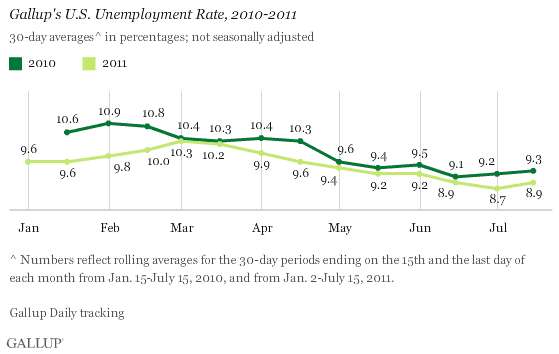
According to the latest Gallup Poll.Unemployment, as measured by Gallup without seasonal adjustment, is at 8.9% in the middle of July — up from 8.7% at the end of June. Unemployment was at 9.3% at this same time a year ago.
The percentage of part-time workers who want full-time work is 9.4% in mid-July — down from 9.6% at the end of June. However, more Americans are working part time but seeking full-time work in mid-July 2011 than was the case in mid-July 2010 (9.0%).
Underemployment Shows No Improvement
Underemployment, a measure that combines the percentage of unemployed with the percentage working part time but wanting full-time work, is at 18.3% in mid-July — precisely the same as at the end of June and in mid-July 2010.
The chart:

So, what does this all mean?
American unemployment will continue to dog the Obama administration throughout the summer. The job situation is about the same as last year and there appear to be no help on the way.
Gallup’s modeling of its most recent unemployment results suggests an early July deterioration in the U.S. jobs situation. This may be partly a lagged effect of the economic soft patch during the first two quarters of 2011. It may also be a sign that many employers are pulling back on their hiring intentions, as slower-than-expected economic growth has reduced their sales and revenue expectations for the second half of the year.
Company hiring may also be suffering from the political rhetoric surrounding the debate over raising the federal debt limit. There seems to be a lack of clarity about exactly what would happen if the federal government is temporarily unable to pay its obligations — although everyone knows such an outcome would not be good. In addition, there are uncertainties on Wall Street, financial problems in Europe, and a sharp drop in economic confidence on Main Street. It is hard to hire when business prospects become so much more uncertain than usual.
Federal Reserve Chairman Ben Bernanke, in his testimony before the Congress last week, repeated his view that the weakness in today’s economy is temporary and that economic activity will pick up in the second half of 2011. At this point, the lack of job growth as reflected by Gallup’s unemployment, underemployment, and job creation data does not support that assessment. Instead, Gallup’s survey results tend to imply that the current economic soft patch may be somewhat less transitory than the Fed chief hopes.
The chart as to how Gallup’s unemployment rate differs from the U.S. Bureau of Labor Statistics.

-
Poll Watch: For Many Americans the Economic Recession Persists
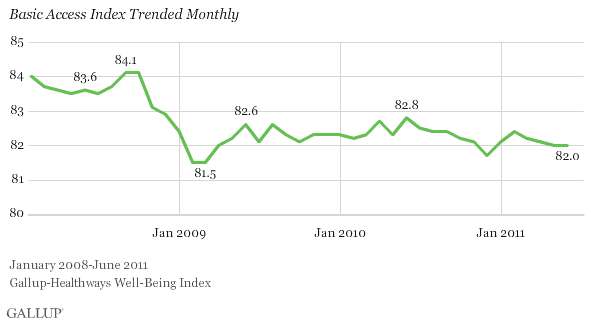 According to the latest Gallup Poll.
According to the latest Gallup Poll.More Americans continue to struggle to access basic necessities than before the 2008 economic crisis. The U.S. earned a Basic Access Index score of 82.0 in June — about on par with the low point of 81.5 recorded in February and March of 2009 — and down compared with 83.6 measured in June 2008.
The current score is more than two points lower than the highest measured point of 84.1 in October 2008, revealing that nearly 5 million fewer Americans today have access to the basic necessities of life compared to that time.
These findings are based on approximately 29,000 interviews conducted each month from January 2008 through June 2011 with American adults as a part of the Gallup-Healthways Well-Being Index. The Basic Access Index is a 13-item measure of Americans’ access to basic necessities, ranging from food and shelter to clean water and healthcare.
Fewer Americans have health insurance or a personal physician
Americans’ access to health insurance declined the most among the items included in the Basic Access Index. In June 2011, 82.1% reported having health insurance, continuing a steady decline from 85.4% in June 2008. Fewer Americans also report having a personal doctor and visiting the dentist at least once in the last 12 months. “Enough money to buy food at all times in the last 12 months” is also trending lower compared to 2008 and 2009.
The chart:
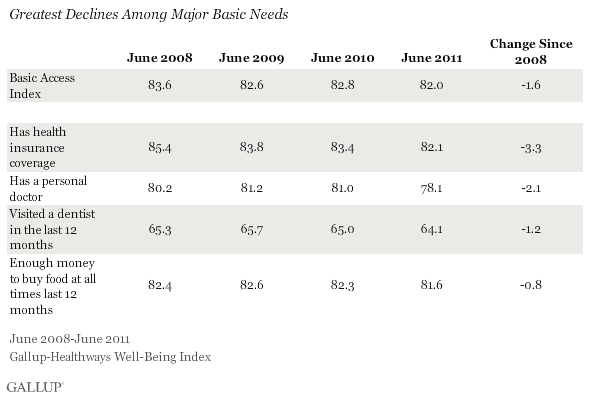
So, what does this all mean?
I would not want to be an incumbent politician running in 2012. Voters who cannot meet basic needs will eventually lash out at the ballot box.
The idea that the 2008 economic recession is over is a fallacy.
The continued lack of recovery in the Basic Access Index metrics overall in 2011 shows that Americans are still lagging behind prior years in terms of their access to the basic necessities that foster a healthy, productive life. While Gallup has documented the decline in access to health insurance in recent years, important elements of healthcare including Americans’ ability to maintain a personal doctor and visit the dentist have also been casualties of the economic recession. This means millions fewer American adults have those basic needs met now than did before the financial crisis, despite modest improvements found in some areas. These results lend further evidence to the sluggishness of the current economic recovery, and underscore in real terms the health impact of the recession on the lives of American adults.
-
Poll Watch: U.S. Satisfaction Falls to Two Year Low = 16%
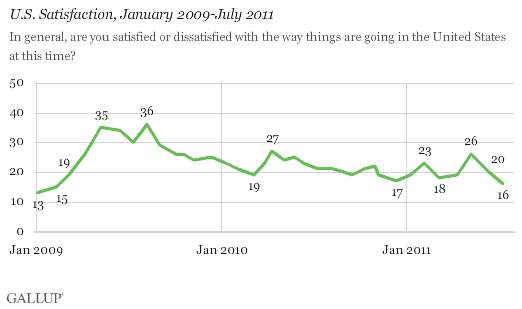 According to the latest Gallup Poll.
According to the latest Gallup Poll.Americans’ satisfaction with the way things are going in the country fell to 16% in July, the lowest in more than two years. Satisfaction approached this level in December 2010, when it descended to 17%, but it has not registered as low as 16% since February 2009 — President Barack Obama’s first full month in office — when it was 15%.
Not a good sign for the incumbent President or members of Congress.
Satisfaction fell four percentage points just in the last month, from 20% in June. Among party groups, Democrats’ satisfaction has dropped the most, from 35% to 25%. Independents’ satisfaction in June and July was fairly steady at 17% and 14%, respectively, and Republicans’ was unchanged at 9%.
Looks like even Democrats are giving up on President Obama and his administration.
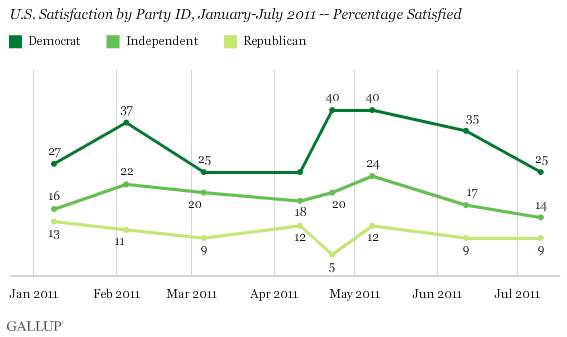 Fewer Americans are satisfied with the way things are going in the country today than were satisfied in June or in any month since February 2009. The recent month-to-month decline is seen particularly among Democrats, but is also evident among whites, broadly.
Fewer Americans are satisfied with the way things are going in the country today than were satisfied in June or in any month since February 2009. The recent month-to-month decline is seen particularly among Democrats, but is also evident among whites, broadly.Americans’ approval of Obama and of Congress, along with their economic confidence ratings, are all similar to where they stood in June, as well as prior to the bin Laden-related rally in April. Whether the dampened satisfaction this month is a temporary finding or the precursor for a possible decline in Gallup’s political and economic indicators remains to be seen.
-
Poll Watch: Americans Prefer Spending Cuts But Are Open to Tax Increases
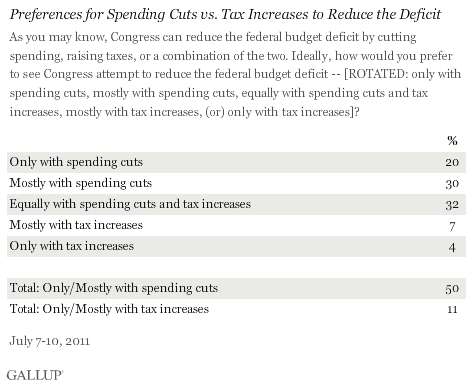 According to the latest Gallup Poll.
According to the latest Gallup Poll.Americans’ preferences for deficit reduction clearly favor spending cuts to tax increases, but most Americans favor a mix of the two approaches. Twenty percent favor an approach that relies only on spending cuts and 4% favor an approach that uses tax increases alone.
These results are based on a July 7-10 Gallup poll, conducted as government leaders from both parties continued negotiating an agreement to raise the federal debt limit. Both Republicans and Democrats appear willing to raise the debt limit, provided the government outlines plans to significantly reduce federal deficits in the future. The parties generally agree on making deep spending cuts, but do not agree on whether tax increases should be included to help reach their target goals for deficit reduction. Many Republicans in Congress oppose any such tax increases; thus, the legislation may not pass if tax hikes are included.
Americans do not necessarily share this view, with 20% saying deficit reduction should come only through spending cuts. That percentage is a little higher, 26%, among those who identify as Republicans. Republicans do, however, tilt heavily in favor of reducing the deficit primarily if not exclusively with spending cuts (67%) as opposed to tax increases (3%). Fifty-one percent of independents share that preference. Democrats are most inclined to want equal amounts of spending cuts and tax increases (42%), though more favor a tilt toward spending cuts (33%) than tax increases (20%).
So, what does this all mean?
There is political cover for Republicans to accept some tax increases or tax reform in return for receiving massive concessions from Congressional Democrats and President Obama on government spending.
But, whether Republicans will accept ANY tax increases and then vote to increase the debt ceiling is doubtful.
The best approach may be for the GOP House to vote for a three or six month debt ceiling extension without tax increases (all cuts) and dare Democrats in the Senate to filibuster it or President Obama to exercise his veto.
-
Poll Watch: 53 Per Cent Want Their Representative in Congress to Vote Against Raising Debt Ceiling
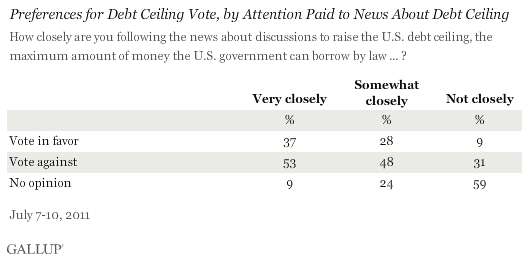 According to the latest Gallup Poll.
According to the latest Gallup Poll.Echoing resistance to raising the nation’s debt ceiling among the public at large, 53% of Americans who say they are following the issue very closely in the news want their member of Congress to vote against raising the debt limit, while 37% urge a vote in favor.
This 16-percentage-point margin against raising the debt limit among the most attentive Americans is similar to the 20-point margin among those following the matter somewhat closely, 48% vs. 28%. Those not following the issue closely are also more likely to want their member of Congress to vote against raising the debt limit than for it; however, the majority, 59%, have no opinion.
Similarly, the Americans most attentive to the debt ceiling issue are no more anxious about the potential negative economic fallout should the debt ceiling not be raised than are those paying less attention to the issue. The majority of those following the issue very closely say they are more worried that the government would raise the debt ceiling without plans for major cuts in future spending than they are that not raising the debt ceiling would result in a major economic crisis.
The United States should honor its financial obligations but there needs to be dramatic reform, otherwise the POLS will just spend more money (which we don’t have) to get re-elected. If the President and Congress cannot agree on a long term deal then they should pass a short term one and revisit the issue in six months.
And, President Obama should refrain from trying to scare senior citizens. This is demagoguery at its worse and most seniors understand that it is all Obama bluster in order to obtain votes for his re-election effort.
Americans’ general opposition to raising the nation’s debt ceiling limit — at least in the abstract — does not primarily reflect low public awareness of the president’s warnings about the perils of not raising it. In fact, the majority of Americans who say they are following the issue very closely oppose it, and are more concerned about the impact that raising the debt limit would have on future U.S. deficit spending than the possibility of an economic crisis if it is not raised.
In trying to win more public support for raising the debt ceiling, President Obama appealed to seniors Tuesday, warning that failure to do so could put a freeze on Social Security checks as soon as Aug. 3. Obama’s approval rating among seniors is currently at 39%, the lowest of any age group. However, seniors are also the age group paying closest attention to the deficit issue and might be persuaded to rethink their position on the debt ceiling (currently 26% are in favor of raising it and 48% opposed) if they believe their retirement income is at risk.
-
President 2012: Obama Says It Is Time to Eat Our Peas
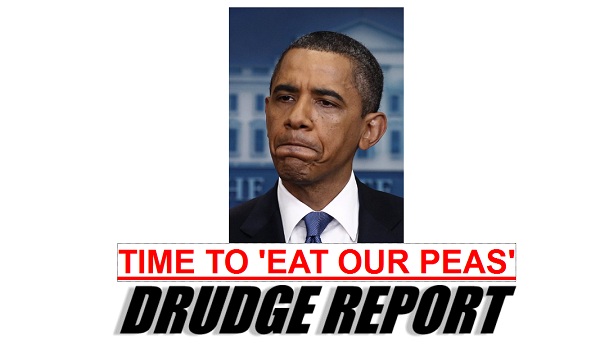
I mean really how stupid is this?“I will not sign a 30-day or a 60-day or a 90-day extension. That is just not an acceptable approach. And if we think it’s hard now, imagine how these guys are going to be thinking six months from now in the middle of election season when they are all up. It’s not going to get easier, it’s going to get harder. So, we might as well do it now. Pull off the band-aid. Eat our peas. Now is the time to do it. If not now, when? We keep on talking about this stuff, and we have these high-minded pronouncements about how we’ve got to get control of the deficit, how we owe it to our children and our grandchildren. Well, let’s step up. Let’s do it,” President Obama said at his press conference today.
Mr. President, where in the frak have you been the past few years?
You have greatly expanded the national debt over the life of your administration, a trillion dollars alone on your failed economic stimulus program. Unemployment has increased and you have made the American economy worse.
Now, you want the Republicans to eat their peas?
Come on, you are not serious about limiting spending and the debt, you simply want political cover for your failed economic policies. You are not fooling anyone.
-
Poll Watch: Job Creation Index Edges Higher But Employers Still NOT Eager to Hire
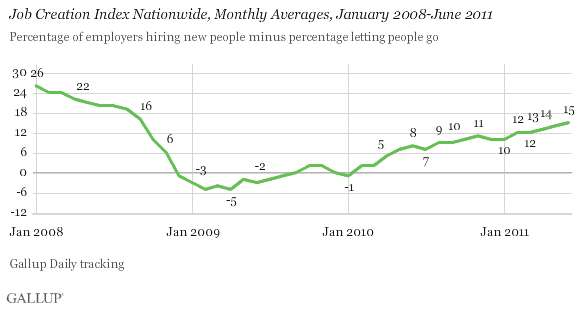
According to the latest Gallup Poll.Gallup’s Job Creation Index was at +15 in June. While this does not differ much from the +14 of May or the +13 of April, it is the highest since September 2008’s +16.
The Job Creation Index has increased steadily if marginally in 2011. This continues a pattern that began after the Index matched its low point of -5 in April 2009, and is consistent with the improvement in the overall U.S. job situation over the past couple of years.
Hiring has increased moderately in 2011.
The Job Creation Index score of +15 in June is based on 33% of workers nationwide saying their employers are hiring and 18% saying their employers are letting workers go. Between 18% and 19% of workers have said their employers are reducing staff size throughout the first half of 2011. However, there has been a slight increase in the percentage saying their companies are hiring employees and expanding their workforces, from 29% in January to 33% in June.
Here is the graph.
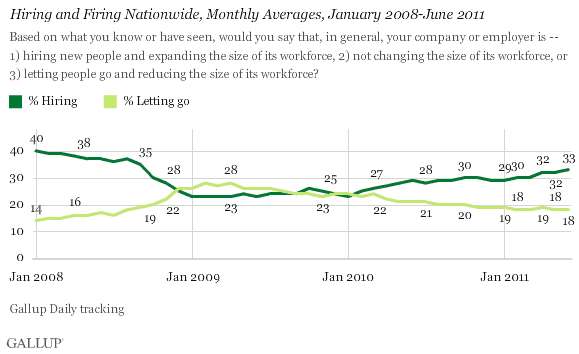 And, what about regional job creation? Hiring patterns are similar.
And, what about regional job creation? Hiring patterns are similar.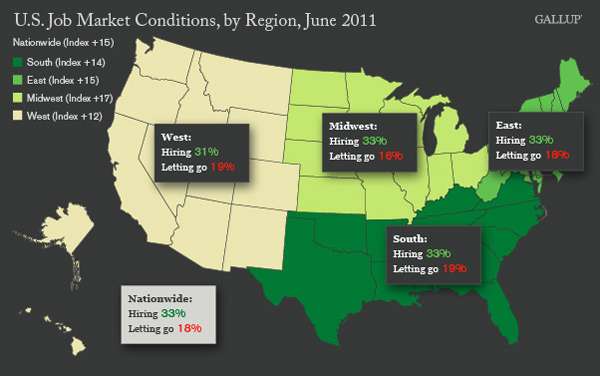
So, what does this all mean?
Job creation is slow and has remained so. With vast numbers of unemployed Americans, it is doubtful that robust job growth will be realized before the Presidential race for 2012 begins after this summer.
President Obama will have to run on this record of anemic job growth and high unemployment.
Gallup’s Job Creation Index, at +15 for June 2011, is much improved over June 2010’s +8 and June 2009’s -3 readings. One reason for this improvement, according to employee reports, is that the nation’s employers are holding on to their workers; the percentage currently letting people go is just about where it was in June 2008. Additionally, the percentage reporting their employer is hiring has increased slightly during the first half of 2011.
However, companies are still not in a hurry to hire. The percentage saying their employers were hiring in June is down seven points from January 2008, when the recession was just getting underway. New jobs are being created at an anemic pace compared with what is needed to lower the U.S. unemployment and underemployment rates. These job creation trends are consistent with Gallup’s recent unemployment report that shows the current job situation has seen little year-over-year improvement.
These job creation findings are also consistent with the recent trend in jobless claims, whose four-week average is currently 426,750. This is better than the year-ago numbers, but — like the job creation trend — is not enough of an improvement to support a decline in the unemployment rate. In this regard, the modest improvement in Gallup’s Job Creation Index over recent months is also consistent with the consensus among economists that there will be essentially no change when the government reports the June unemployment rate on Friday.
Right now, Gallup’s job data suggest that job market conditions are slightly more positive than the government’s numbers show. Although economists declared the recession over two years ago, job growth has a long way to go, with the current Job Creation Index nowhere near the +26 seen just as the recession was beginning in January 2008. -
Poll Watch: United States Economic Confidence Remains Low
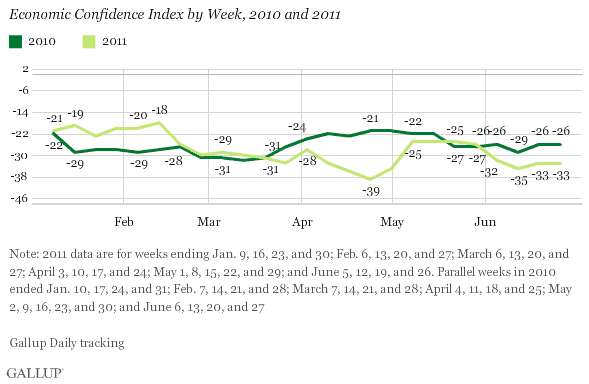 According to the latest Gallup Poll.
According to the latest Gallup Poll.After surging in May, Americans’ economic confidence receded in early June and remains near its 2011 low, averaging -33 in the week ending June 26. This is down seven percentage points from the week ending May 29 and down a similar amount compared with the same week a year ago.
U.S. economic confidence peaked this year at -18 in February and then generally declined, reaching -39 during week ending April 24, as gas prices surged and economic activity slowed. Confidence increased in May, averaging -26, likely in response to the news of Osama bin Laden’s death in a U.S. military raid.
Gallup’s Economic Confidence Index combines two measures: one assessing Americans’ views about whether the U.S. economy is “getting better” or “getting worse,” and the second involving Americans’ ratings of current economic conditions as “excellent,” “good,” “only fair,” or “poor.” Both ratings have deteriorated thus far in June.
Only 31% say that the U.S. economy is getting better.
The graph:
 45 % of Americans rate the American economy is poor:
45 % of Americans rate the American economy is poor: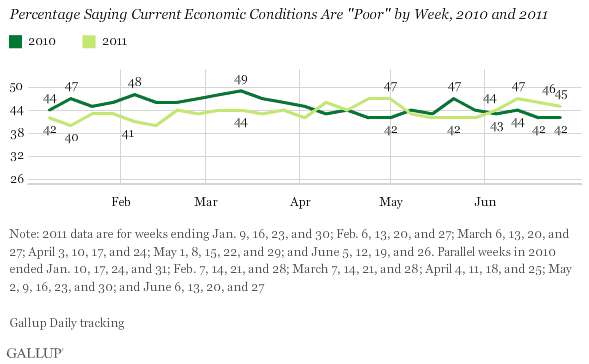 So, what does this all mean?
So, what does this all mean?Perception of the economy is important to voters. If President Obama and his cronies in the Congress wish to be re-elected they will have to make the case that their stewardship of the economy has been successful. Poll numbers are not demonstrating this perception.
The worsening of Gallup’s economic confidence measure during June may be due in part to the dissipation of the “halo effect” surrounding the death of bin Laden. Confidence has now moved back near the April 2011 low. This suggests that the consumer benefits associated with steadily declining gas prices at the pump — down 14 cents per gallon in the past two weeks — are being offset by other factors. One such factor might just be that gas prices remain 82 cents per gallon higher than they were a year ago. Another could be the continuing dismal jobs situation.
Federal Reserve Board Chairman Ben Bernanke last week seemed to add to the growing economic pessimism, noting that the Fed has reduced its 2011 growth forecast for the U.S. economy. Wall Street continues to suffer as a result of the Fed’s apparent confirmation of the economic “soft patch” and the financial problems in Europe. The battle over raising the debt ceiling has not disrupted the money markets to this point, but certainly represents another negative for overall economic confidence.
It may be that declining gas prices will eventually lead to improved consumer confidence and increased consumer spending, which could make the current economic soft patch modest and transitory. At this point, however, Gallup’s monitoring of economic confidence does not support that idea.
-
President 2012: In Key Battleground States Unemployment Has Increased Since October 2008

Electoral College vote map of Larry Sabato
Chris illizza over at the Washington Post looks at key battleground states for the Presidential race of 2012 and gives the data. You know the question in one of the Presidential debates to President Obama will be (like GOP challenger Ronald Reagan asked President Jimmy Carter in 1980): “Are you better off than you were four years ago?”Well, with the regards to unemployment the news is not good for President Obama.
And that raw political reality could put President Obama in a difficult spot as he prepares to seek another four years in the White House amid conflicting signs about the relative health of the economy.
The state-by-state unemployment numbers released late last week by the Bureau of Labor Statistics tell the story.
In every one of the 14 swing states heading into 2012 — Colorado, Florida, Indiana, Iowa, Michigan, Minnesota, New Mexico, New Hampshire, Nevada, North Carolina, Ohio, Pennsylvania, Virginia and Wisconsin — the unemployment rate has risen since October 2008.
The increases range from the tiny — just a 0.7-point jump in Minnesota and New Hampshire — to the titanic in places like Nevada (up 4.4 points) and Florida (up 3.6).
And, Obama’s only response will be: “You should have seen how bad it would have been.”
I don’t know if this is going to wash in Nevada and Florida.
But, on the other hand of these 14 swing states that Cillizza mentions only 4 have May unemployment above the national average. But, you know that is spin and unemployment generally is worse since President Obama has been in office.
President Reagan beat Jimmy Carter on the answer to the “better off” question. He won re-election because while unemployment was high, it was improving.
That “trend line” vote is why the late President Ronald Reagan won a second term overwhelmingly in 1984 despite the fact that the unemployment rate was at 7.3 percent in October of the election year. (It had been at 10.3 percent as recently as March 1983.)
The best way for Obama to counteract the “are you better off” question is to have evidence to point to that things are turning around — that whether or not you believe the country was on the brink of an economic catastrophe you see signs that your financial situation is improving and have reason to hope the future will be brighter.
The latest Washington Post/ABC News poll suggests he’s not there yet.
No, President Obama is not there yet and unless the economy improves very quickly, he will go the way of Jimmy Carter.